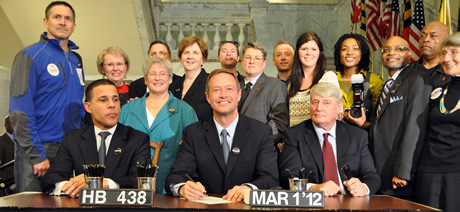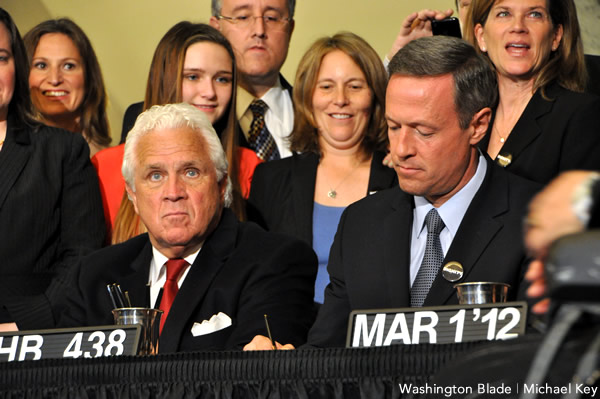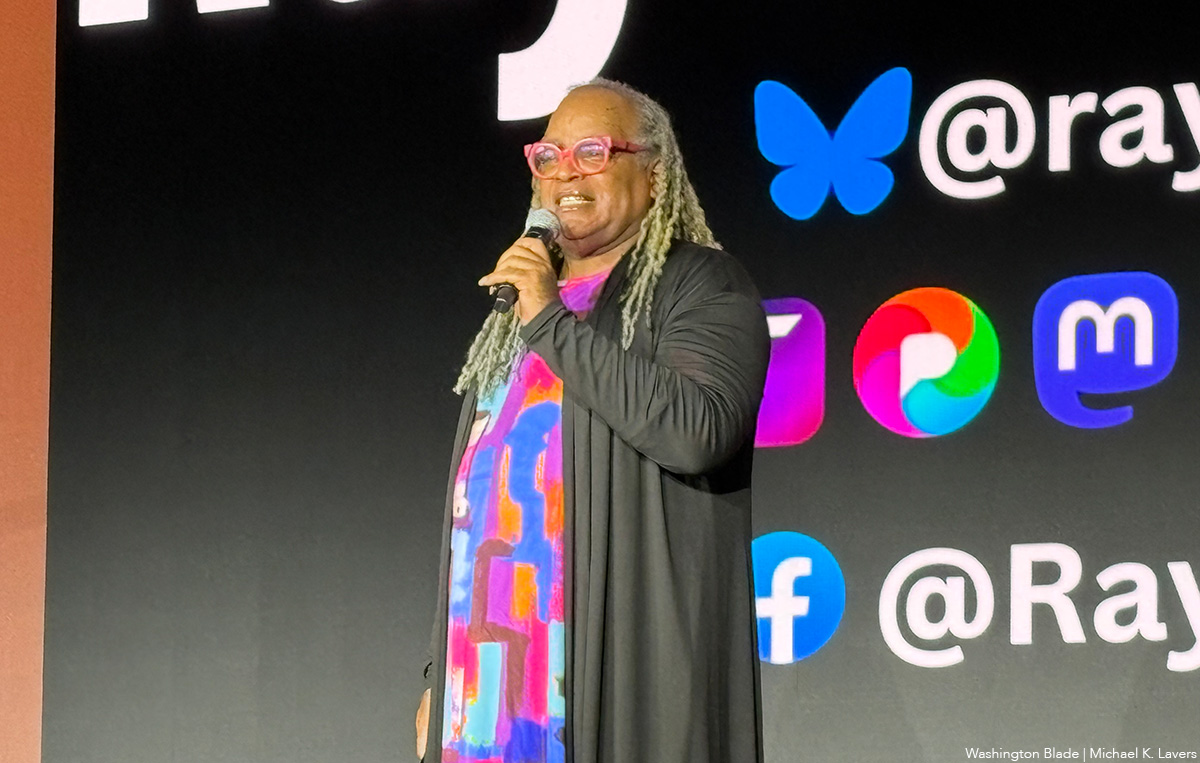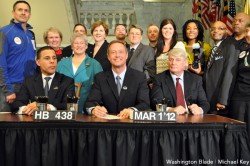Local
O’Malley signs marriage bill
Same-sex couples, gay law makers join jubilant supporters in ceremony at State House


Thursday, Gov. Martin O'Malley signed the historic bill making Maryland next in line to join D.C. and six other states in recognizing same-sex marriage. (Washington Blade photo by Michael Key)
With a crowd of same-sex couples and the eight openly gay and lesbian members of the Maryland Legislature standing behind him, Maryland Gov. Martin O’Malley Thursday afternoon signed the Civil Marriage Protection Act, which calls for legalizing same-sex marriage in the state.
House of Delegates Speaker Michael Busch (D-Anne Arundel County) and Senate President Thomas V. Mike Miller (D-Prince George’s and Calvert Counties) joined O’Malley in signing the bill before a crowd of hundreds of supporters who packed the lobby of the state capital building in Annapolis.
“We are all Americans. And all of us at end of the day want the same thing for our children. We want them to live in a loving, caring, and committed home that is protected equally under the law,” O’Malley said minutes before signing the bill.
O’Malley made no mention of a voter referendum expected to be placed on the ballot in November calling for killing the bill before it becomes law. But his brief remarks at the bill signing ceremony appeared to reflect the themes that Annapolis observers expect O’Malley to use to defend the bill before voters in the fall.
“For a free and diverse people, for people of many faiths, for a people committed to the principle of religious freedom, the way forward is always found through greater respect for the equal rights of all, for the eminent dignity of all,” O’Malley said.
“Religious freedom was the very reason for our state’s founding and the heart of religious freedom is the freedom of individual conscience,” he said. “If there is a thread that unites all of our work here it is the thread of human dignity, the dignity of work, the dignity of the job, the dignity of every child’s health, the dignity of every individual.”
After signing the bill at a table placed at the foot of a curved, marble staircase where dozens of supporters stood, O’Malley handed the legislation to Busch and Miller, who placed their signature on the document.
Miller voted against the bill; Busch voted for it.
“The bill is signed,” O’Malley declared, triggering a burst of applause and cheers from the crowd.
Many of the same-sex couples in the audience held young children in their arms and embraced one another as O’Malley handed a collection of pens he used to sign the measure to well-wishers who rushed up to the governor to shake his hand.
Officials with Marylanders for Marriage Equality, the coalition of LGBT and straight allied groups that coordinated the effort to pass the bill in the legislature said that, while celebrating their legislative victory on Thursday, they were gearing up for the referendum fight.
Most agreed that O’Malley’s signature on the Civil Marriage Protection Act was the kick-off for what political observers predict will be an acrimonious referendum campaign in which opponents, as they have in other states, will warn that legalizing same-sex marriage would result in the “teaching” of homosexuality in elementary schools.
Joe Solmonese, president of the Human Rights Campaign, which initiated the Marylanders for Marriage coalition, said he was hopeful that the same-sex marriage law would survive a referendum. He pointed to public opinion polls showing Maryland voters support legalizing same-sex marriage by a slim majority over those who oppose it.
“We recognize there is a great deal of work to do between now and November and we stand ready and committed to do the work,” he said.
“The changes in the hearts and minds of people on this issue are moving so rapidly. A year now is like a decade in this fight,” he said. “So the strength of this legislative victory and this being a presidential election year and the turn out being what it will be, I’m optimistic about the prospects for winning.”
Lesbian House of Delegates member Heather Mizeur (D-Montgomery County) and her gay colleagues, Del. Peter Murphy (D-Charles County) and Del. Luke Clippinger (D-Baltimore City) agreed with Solmonese’s assessment.
The state Board of Elections on Wednesday approved the language for the referendum petition; opponents are awaiting written confirmation from the board to begin gathering signatures, according to an AP report. Petition drafts filed by opponents Del. Neil Parrott and the Maryland Marriage Alliance contain typos but are otherwise compliant, according to the AP.
Opponents were expected to gather the required number of petition signatures needed to place the referendum on the ballot for the November election.
The referendum campaign received a boost last Friday, when the Fox TV station in Baltimore, WBFF, posted a prominent link to the website gathering signatures for the referendum on its homepage.
Scott Livingston, news director at WBFF, denied any corporate involvement in promoting the referendum campaign.
“We are not endorsing any element of this debate,” Livingston told the Blade. “We see it as a political process. Our goal is letting viewers understand they have a voice in the debate.” He added that the site has now been “modified.”
The link that previously sent readers directly to the petition site now goes to a new page within the WBFF site that also includes a link to Equality Maryland’s website. The change followed what Livingston characterized as a “handful” of complaints from WBFF viewers.
The governor’s bill signing ceremony took place one week after the Maryland Senate voted 25 to 22 to approve the marriage bill. The vote came after senators supporting the bill defeated six hostile amendments introduced by opponents.
The previous week, the state’s House of Delegates passed the bill with a razor-thin two-vote margin.
Virginia
McPike wins special election for Va. House of Delegates
Gay Alexandria City Council member becomes 8th LGBTQ member of legislature

Gay Alexandria City Council member Kirk McPike emerged as the decisive winner in a Feb. 10 special election for a seat in the Virginia House of Delegates representing Alexandria.
McPike, a Democrat, received 81.5 percent of the vote in his race against Republican Mason Butler, according to the local publication ALX Now.
He first won election to the Alexandria Council in 2021. He will be filling the House of Delegates seat being vacated by Del. Elizabeth Bennett-Parker (D-Alexandria), who won in another Feb. 10 special election for the Virginia State Senate seat being vacated by gay Sen. Adam Ebbin (D-Alexandria).
Ebbin is resigning from his Senate next week to take a position with Virginia Gov. Abigail Spanberger’s administration.
Upon taking his 5th District seat in the House of Delegate, McPike will become the eighth out LGBTQ member of the Virginia General Assembly. Among those he will be joining is Sen. Danica Roem (D-Manassas), who became the Virginia Legislature’s first transgender member when she won election to the House of Delegates in 2017 before being elected to the Senate in 2023.
“I look forward to continuing to work to address our housing crisis, the challenge of climate change, and the damaging impacts of the Trump administration on the immigrant families, LGBTQ+ Virginians, and federal employees who call Alexandria home,” McPike said in a statement after winning the Democratic nomination for the seat in a special primary held on Jan. 20.
McPike, a longtime LGBTQ rights advocate, has served for the past 13 years as chief of staff for gay U.S. Rep. Mark Takano (D-Calif.) and has remained in that position during his tenure on the Alexandria Council. He said he will resign from that position before taking office in the House of Delegates.
Local
Local LGBTQ groups, activists to commemorate Black History Month
Rayceen Pendarvis to moderate Dupont Underground panel on Sunday

LGBTQ groups in D.C. and elsewhere plan to use Black History Month as an opportunity to commemorate and celebrate Black lives and experiences.
Team Rayceen Productions has no specific events planned, but co-founder Rayceen Pendarvis will attend many functions around D.C. this month.
Pendarvis, a longtime voice in the LGBTQ community in D.C. moderated a panel at Dupont Underground on Feb. 8. The event, “Every (Body) Wants to Be a Showgirl,” will feature art from Black burlesque artists from around the country. Pendarvis on Feb. 23 will attend the showing of multimedia play at the Lincoln Theatre that commemorates the life of James Baldwin.
Equality Virginia plans to prioritize Black voices through a weekly online series, and community-based story telling. The online digital series will center Black LGBTQ voices, specifically trailblazers and activists, and contemporary Black queer and transgender people.
Narissa Rahaman, Equality Virginia’s executive director, stressed the importance of the Black queer community to the overall Pride movement, and said “Equality Virginia is proud to center those voices in our work this month and beyond.”
The Capital Pride Alliance, which hosts Pride events in D.C., has an alliance with the Center for Black Equity, which brings Black Pride to D.C. over Memorial Day weekend. The National LGBTQ Task Force has no specific Black History Month events planned, but plans to participate in online collaborations.
Cathy Renna, the Task Force’s director of communications, told the Washington Blade the organization remains committed to uplifting Black voices. “Our priority is keeping this at the forefront everyday,” she said.
The D.C. LGBTQ+ Community Center is also hosting a series of Black History Month events.
The D.C. Public Library earlier this year launched “Freedom and Resistance,” an exhibition that celebrates Black History Month and Martin Luther King Jr. It will remain on display until the middle of March at the Martin Luther King Jr. Memorial Library at 901 G St., N.W.
District of Columbia
U.S. Attorney’s Office drops hate crime charge in anti-gay assault
Case remains under investigation and ‘further charges’ could come

D.C. police announced on Feb. 9 that they had arrested two days earlier on Feb. 7 a Germantown, Md., man on a charge of simple assault with a hate crime designation after the man allegedly assaulted a gay man at 14th and Q Streets, N.W., while using “homophobic slurs.”
But D.C. Superior Court records show that prosecutors with the Office of the U.S. Attorney for D.C., which prosecutes D.C. violent crime cases, charged the arrested man only with simple assault without a hate crime designation.
In response to a request by the Washington Blade for the reason why the hate crime designation was dropped, a spokesperson for the U.S. Attorney’s office provided this response: “We continue to investigate this matter and make no mistake: should the evidence call for further charges, we will not hesitate to charge them.”
In a statement announcing the arrest in this case, D.C. police stated, “On Saturday, February 7, 2026, at approximately 7:45 p.m. the victim and suspect were in the 1500 block of 14th Street, Northwest. The suspect requested a ‘high five’ from the victim. The victim declined and continued walking,” the statement says.
“The suspect assaulted the victim and used homophobic slurs,” the police statement continues. “The suspect was apprehended by responding officers.”
It adds that 26-year-old Dean Edmundson of Germantown, Md. “was arrested and charged with Simple Assault (Hate/Bias).” The statement also adds, “A designation as a hate crime by MPD does not mean that prosecutors will prosecute it as a hate crime.”
Under D.C.’s Bias Related Crime Act of 1989, penalties for crimes motivated by prejudice against individuals based on race, religion, sexual orientation, gender identity, disability, and homelessness can be enhanced by a court upon conviction by one and a half times greater than the penalty of the underlying crime.
Prosecutors in the past both in D.C. and other states have said they sometimes decide not to include a hate crime designation in assault cases if they don’t think the evidence is sufficient to obtain a conviction by a jury. In some instances, prosecutors have said they were concerned that a skeptical jury might decide to find a defendant not guilty of the underlying assault charge if they did not believe a motive of hate was involved.
A more detailed arrest affidavit filed by D.C. police in Superior Court appears to support the charge of a hate crime designation.
“The victim stated that they refused to High-Five Defendant Edmondson, which, upon that happening, Defendant Edmondson started walking behind both the victim and witness, calling the victim, “bald, ugly, and gay,” the arrest affidavit states.
“The victim stated that upon being called that, Defendant Edmundson pushed the victim with both hands, shoving them, causing the victim to feel the force of the push,” the affidavit continues. “The victim stated that they felt offended and that they were also gay,” it says.



















